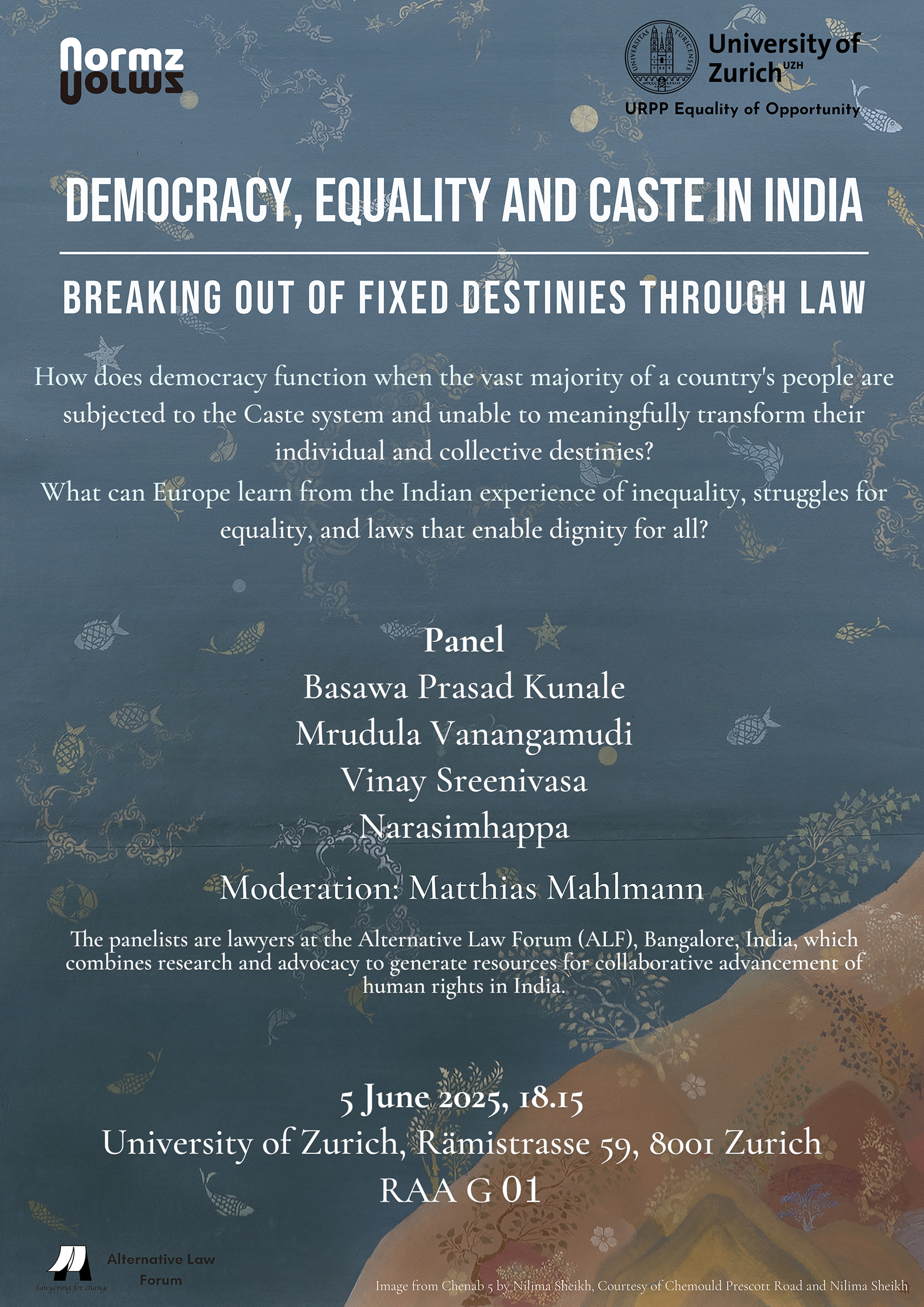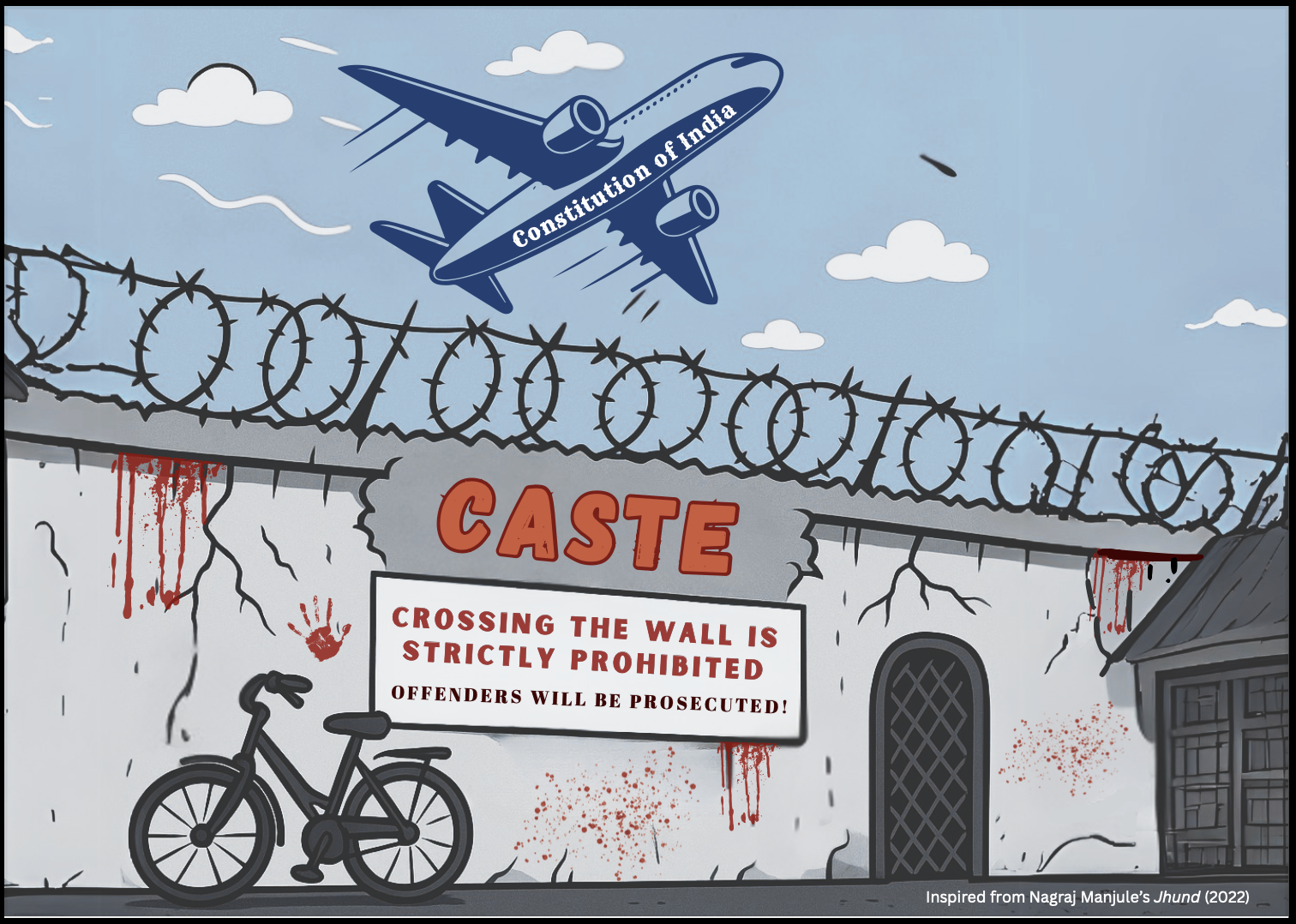Alternative Law Forum, Bangalore Panel
The Alternative Law Forum (ALF) – Democracy, Equality and Caste in India
The University of Zurich was delighted to invite the Alternative Law Forum (ALF) to a panel discussion on Democracy, Equality and Caste in India. This event took place within the context of a broader collaboration with the National Law School of India. The panellists were:
- Mrudula Vanangamudi, a human rights lawyer and full-time litigator at ALF, whose areas of work include rights of gender and sexual minorities, women, land rights of marginalised groups, institutional discrimination, criminal law and digital rights.
- Basawa Prasad Kunale, a lawyer and full-time litigator at ALF, whose work focuses on criminal and labour law. and he is a practicing advocate at the High Court of Karnataka. His major area of work involves criminal and constitutional law litigation. He is also actively involved in the advocacy work in the form of legal representation to the victims of caste-based atrocities in Karnataka and through workshops on the rights of these victims under the law.
- T.V. Narasimhappa, a lawyer with ALF who specialises in litigation concerning child development and practices as an Advocate across all trial courts in Bangalore City, Karnataka. He is also engaged in providing legal training on special laws related to the Scheduled Castes and Scheduled Tribes (Prevention of Atrocities Act and others), with a focus on legal empowerment.
The panellists began the discussion by attempting to reach a consensus on the definition of democracy. They drew upon the work of Dr B.R. Ambedkar, a renowned Indian jurist and principal architect of the Indian Constitution, who defined democracy as a mode of associated living rooted in social relationships. The reason for adopting this working definition was highlighted by several harrowing examples of social exclusion through caste discrimination in Indian society. These included continuing practices of untouchability, caste-based violence, and the refusal to allow Dalits (formerly referred to as “untouchables”) to enter places of worship.
The panellists then provided a comprehensive overview of the socio-religious system underpinning this systemic discrimination: the caste system. At the top of this hierarchy are the Brahmins (the priestly caste), and at the bottom are the Dalits (the outcasts). According to Hinduism, following the principle of reincarnation, a person is born into their caste based on the karma of actions from a previous life. As such, Brahmins are seen as pure and are therefore afforded the most privilege in society, whereas Dalits are believed to be inherently sinful and are consequently excommunicated from social life. This system is upheld through a mechanism of graded inequality, whereby members of lowered castes oppress those below them to preserve their own relative privilege.
The panellists explained that the significance of this system, and the challenges involved in combatting it, can best be understood by understanding that caste is viewed in Indian society as a form of law. Under the caste rules, the best course of action for a lowered-caste individual is to conform to the caste order, in the hope of being reborn into a higher caste in the next life. Conversely, those who defy the social order risk being reborn as Dalits.
Despite this deeply entrenched system of inequality, substantive efforts have been made to combat casteism. The panellists explained how the Indian Constitution addresses the caste system: first, by strictly prohibiting caste-based discrimination through criminal sanctions; and second, by using caste as a basis for affirmative action aimed at promoting equality of opportunity.
The first objective has been implemented through specific legislation outlawing practices such as untouchability and enshrining the right to equal treatment under the law. Nevertheless, the panellists outlined significant obstacles to securing convictions in caste-related cases, such as witness intimidation, hostile public sentiment towards prosecutions, and difficulties in gathering sufficient evidence.
The other way the Constitution addresses casteism is by promoting equality of opportunity. The panellists described how affirmative action policies have been deployed to support individuals from lowered castes. While these policies have had some success in improving representation in lower-skilled occupations, they have yet to make a substantial impact in securing representation in more prestigious professions.
The panellists conveyed the complex nature of eradicating casteism, which remains deeply embedded in Indian society. However, their work represents an indispensable resource in raising awareness, and challenging prejudice and structural discrimination through the normative power of law.
The event was very well attended and attracted a broad, cross-disciplinary audience with participants from law, history, and philosophy. The audience’s enthusiasm was reflected in the active participation of many attendees in the question-and-answer session, with questions addressing subjects as varied as the effectiveness of legislative attempts to deal with inequality, the impact of urbanisation on the caste system and the potential for technical advances to influence or mitigate societal inequality.
Podcast
References:
Caste and law:
- Narain, Aravind (2022) "What Would an Ambedkarite Jurisprudence Look like," National Law School of India Review: Vol. 29: Iss. 1, Article 1.
- Galanter, Marc (1969) “Untouchability and the Law”, Economic and Political Weekly, 4(12): 131–3
- Dr. BR Ambedkar: Writings and Speeches (Vol. 5), ‘Held at Bay’ , Chapter 22 , page 270
- Bhatia, Gautam, 'Caste and the Law', in Surinder S. Jodhka, and Jules Naudet (eds), The Oxford Handbook of Caste (2023; online edn, Oxford Academic, 23 Jan. 2024.
Privatisation:
- NH Web Desk. (2019, October 9).”Finance Ministry is planning to close down BSNL and MTNL. National Herald.”
- Rajalakshmi, T. K. (2024, September 2). “UPSC lateral entry recruitment plan may sidestep reservation.” Frontline.
Additional Readings:
- Ambedkar, Bhimrao., Annihilation of Caste. Dr. Babasaheb Writings and Speeches, Volume 1, Dr. Ambedkar Foundation, Ministry of Social Justice and Empowerment, 2020.
- Ambedkar, Bhimrao. Revolution and Counter-Revolution in Ancient India. Dr. Babasaheb Writings and Speeches, Volume 3, Dr. Ambedkar Foundation, Ministry of Social Justice and Empowerment, 2020.
- Ambedkar, Bhimrao. What way to emancipation, Dr. Babasaheb Writings and Speeches, Volume 17 Part 3, Pg. nos. 113-147, Dr. Ambedkar Foundation, Ministry of Social Justice and Empowerment, 2020
- Baxi, Upendra. 1995. ‘Justice as Emancipation: ‘The Legacy of Babasaheb Ambedkar’ in Upendra Baxi and Bhikhu Parekh (eds), Crisis and Change in Contemporary India, pp 122–49, New Delhi: Sage.
- Manoj Mitta, Caste Pride: Battles for Equality in Hindu India. Context Westland Books: A Division of Nasadiya Technologies Pvt. Ltd., 2023, 596 pp., ISBN: 9789357762946

